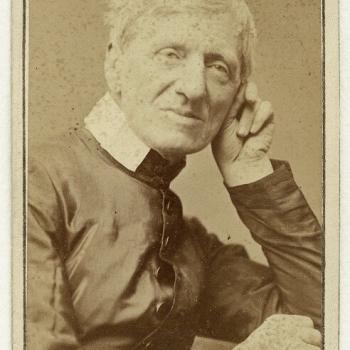By the Rev. Dr. Geoff Nelson
 My dreams are the nightly thin places that I pass through, and paying attention to them has enriched my prayer life for decades. If you are familiar with lectio divina, my practice is a dream lectio. I begin by writing out the dream narrative, then listening to it and thinking about it and doing a rudimentary interpretation, and then forming my prayer for the day. Like lectio divina, it is not a matter of intellectually analyzing or explicating but a way of opening myself to what I am being offered.
My dreams are the nightly thin places that I pass through, and paying attention to them has enriched my prayer life for decades. If you are familiar with lectio divina, my practice is a dream lectio. I begin by writing out the dream narrative, then listening to it and thinking about it and doing a rudimentary interpretation, and then forming my prayer for the day. Like lectio divina, it is not a matter of intellectually analyzing or explicating but a way of opening myself to what I am being offered.
My dream practice has helped me in my life of faith. First, my dreams speak honestly to me, indicating how I really feel, uncensored and sometimes in raw pictures. My dreams do not accept the advice I heard growing up, "If you can't say something nice, don't say anything at all." My dreams do not always speak nice -- but they do speak honestly.
My dreams also help me prioritize my life, reminding me of things I might otherwise slip below the radar of my conscious living. They help me care for my congregation. If I dream of someone I have seen or talked to lately, I use the fact that I dreamt of them to encourage me to pray for them, to think more deeply about them, perhaps to phone them or visit them. My dreams are an added source of information or insight about my life. These first two values of dreams can be used by anyone, whether or not they consider themselves religious.
The third way my dreams help me, more specifically religious, is through the relationship between dreams and prayer. Carl Jung defined ‘synchronicity' as "the not uncommonly observed ‘coincidence' of subjective and objective happenings, which just cannot be explained causally, at least not in the present state of our knowledge.1 " Perhaps you can remember a time when you were thinking of someone you had not heard from in years and, shortly after your thinking about them, they called you or you received a letter from them. Many of us can think of "coincidences" like these in our lives. One of the former archbishops of Canterbury said once that he didn't believe in coincidence, but that the more he prayed, the more it happened.
The occurrences happen more often the more we work with our dreams or the more we pray. This connection between dreamwork and prayer has become a regular part of my life. My wife and I enjoy comparing our frequent synchronicities. And many biblical stories testify to this kind of connection.
The fourth way dreams have helped me in my spiritual life is a kind of biblical literacy that enables me to be more comfortable with such Bible stories and images as Ezekiel's visions, Jesus' parables, and -- especially -- the book of Revelation. All those strange symbols and images in Revelation come right out of the Old Testament and the inter-testamental literature of the Jewish religion. It's as if someone took all those images and put them into a blender, turned it on, and then poured out the mix. The result is a new combination of images that help us understand Jesus and offer new possibilities for life and for the church. In the same way my dreams take images, places, characters, and actions from my life, mix them up, and present me with new visions of my life and new future possibilities.
And my dream practice has also helped through what are called "Big Dreams," dreams so powerful that they may stay with me for years, changing my life. These particularly powerful dreams provide healing or help for things that may have been bothering me for years or with serious current challenges. Such dreams may not happen often, but -- like the experience of prayer and coincidence -- the more we pay attention the more likely we are to have these "big dreams."
This has been some of my experience as I've prayed with my dreams for more than thirty years. And the experience is open to all. We all dream. But very few of us take our dreams seriously, using them as a source of information and help for our lives. Dreams are thin places available to each of us every time we sleep.
Because my own experience with dream lectio has seemed so enriching, I have been eager to share it with others. In working with dream groups, I have found that there are some basic cautions about dreamwork. First of all, like other spiritual practices -- labyrinths, centering prayer, lectio divina -- one needs to actually experience it, to not just read about it or think about it, to begin to gain a sense of what it is. In addition, one must be ready for some honest self-reflection. Many people are initially curious about their dreams, but when they realize their dreams may be telling them deeper things about themselves than they are accustomed to facing, they decide dreamwork is not for them. And, finally, dreamwork can make us very self-absorbed, thus moving us in a direction away from faithful service to Jesus Christ.




